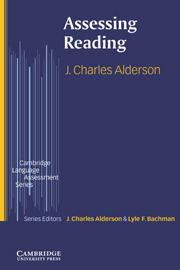Book contents
- Frontmatter
- Contents
- Series Editor's Preface
- Acknowledgements
- Abbreviations
- 1 The nature of reading
- 2 Variables that affect the nature of reading
- 3 Research into the assessment of reading
- 4 The reader: defining the construct of reading ability
- 5 A framework for test design
- 6 Tests in the real world: test purposes
- 7 Techniques for testing reading
- 8 The development of reading ability
- 9 The way forward. Assessing the interation between reader and text: processes and strategies
- Bibliography
- Index
5 - A framework for test design
Published online by Cambridge University Press: 03 May 2010
- Frontmatter
- Contents
- Series Editor's Preface
- Acknowledgements
- Abbreviations
- 1 The nature of reading
- 2 Variables that affect the nature of reading
- 3 Research into the assessment of reading
- 4 The reader: defining the construct of reading ability
- 5 A framework for test design
- 6 Tests in the real world: test purposes
- 7 Techniques for testing reading
- 8 The development of reading ability
- 9 The way forward. Assessing the interation between reader and text: processes and strategies
- Bibliography
- Index
Summary
Introduction
In the last chapter, I examined at some length the classic approach to test design: the development of our test's construct through the writing of test specifications in terms of a theory of reading, and their realisation through the texts we select, the tasks we require readers to perform, the understandings they exhibit, and the inferences we make from those understandings, typically as reflected in scores.
An alternative approach, and one I propose to explore in this chapter, is to examine what Bachman (1990) calls the target language use situation, and to seek to replicate critical features of this in our assessment procedures.
Recall that the goal of our assessment is typically to know how well a reader reads in the real world. As we have seen, reading in the real world is a complex, varied activity: different readers read all sorts of different texts for all sorts of different purposes with all sorts of different outcomes. In order to be able to relate our measurement or assessment to that real world, we need some sort of framework within which we can compare our test or assessment procedure with the real–world activity and outcome. Once we have such a framework, we can then examine the extent to which our results can generalise beyond the testing situation.
Information
- Type
- Chapter
- Information
- Assessing Reading , pp. 138 - 166Publisher: Cambridge University PressPrint publication year: 2000
